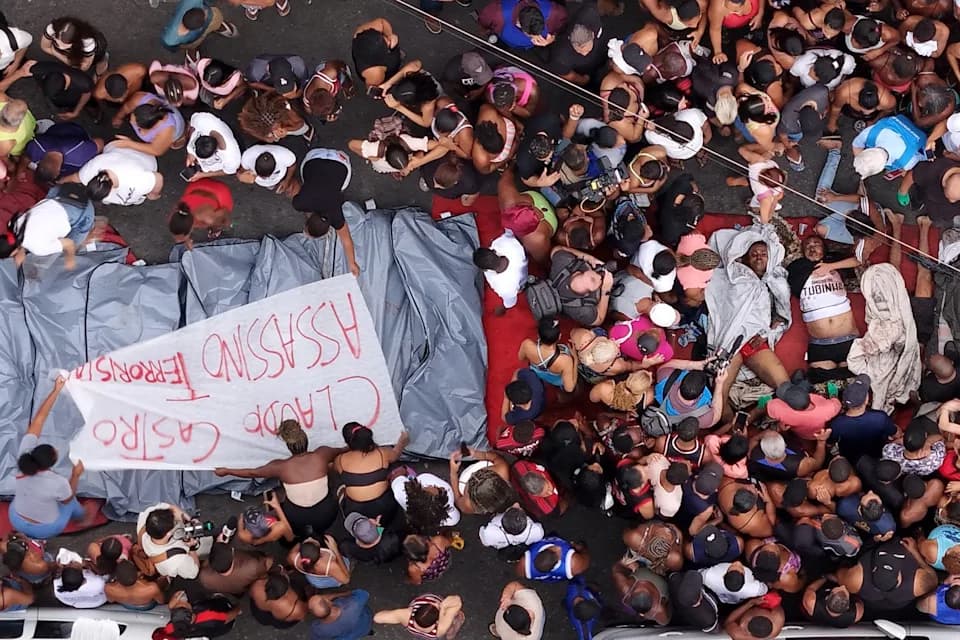We're loading the full news article for you. This includes the article content, images, author information, and related articles.
Brazil's deadliest police operation killed over 100 but failed to capture key gang leaders, sparking international condemnation and a fierce debate over the state's heavy-handed security strategy.

A massive police operation in Rio de Janeiro on Tuesday, 28 October 2025, has left at least 121 people dead, including four police officers, making it the deadliest in the city's history. The raid, dubbed "Operation Containment," involved approximately 2,500 heavily armed military and civil police officers who entered the Alemão and Penha favela complexes in the city's North Zone. The stated goal was to execute over 100 arrest warrants against the Comando Vermelho (Red Command), one of Brazil's most powerful and oldest criminal organizations.
Despite the high death toll, the operation's effectiveness is being questioned. An investigation by BBC Brasil revealed that none of the individuals killed by police were on the list of 69 suspects named by prosecutors, which formed the basis for the raid. Furthermore, only five of the named suspects were arrested, and none were senior leaders of the Comando Vermelho. The gang's top leader, Edgar Alves de Andrade, known as Doca, remains at large.
Rio de Janeiro's state governor, Claudio Castro, hailed the operation as "a success" and a "severe blow" to the criminal organization, posting images of over 100 seized rifles as evidence. He insisted that the casualties were criminals and described the fight as one against "narcoterrorism." Rio's Public Safety Secretary, Victor dos Santos, confirmed to Reuters that the objective was to carry out the arrest warrants. However, the sheer number of fatalities has drawn sharp criticism from human rights organizations, who have labeled the raid a "massacre" and condemned the "brutality" of the police actions.
The operation turned the densely populated neighborhoods into a warzone, with intense shootouts lasting for hours. Gang members reportedly used burning barricades and deployed drones to drop explosives on security forces. The violence disrupted daily life, forcing the closure of dozens of schools and health facilities.
The raid has prompted widespread condemnation from international bodies. The United Nations Human Rights Office stated it was "horrified" by the violence and called for an independent investigation. Amnesty International described the event as a "massacre" perpetrated by the state and highlighted reports of extrajudicial executions, with some bodies allegedly found with hands tied or with gunshot wounds to the back of the head. Human Rights Watch expressed concern that crucial investigative steps, such as preserving crime scenes, were not taken, potentially leading to the loss of important evidence. The Inter-American Commission on Human Rights also condemned the "extremely high" number of deaths and urged the Brazilian government to investigate the entire chain of command.
Brazilian President Luiz Inácio Lula da Silva called the operation a "disastrous" "massacre" and announced that the federal government would seek an independent investigation into the circumstances of the killings. This stance puts him at odds with Governor Castro, who has defended the police action and announced more operations will follow.
The Comando Vermelho, founded in a prison in the 1970s, has grown into a powerful transnational criminal organization involved in drug and arms trafficking. It exerts significant control over many of Rio's favelas, often filling the void left by the state. Deadly police raids are a recurring feature of Brazil's public security strategy, particularly in Rio de Janeiro. Critics argue these militarized operations do little to dismantle criminal structures and disproportionately affect poor, predominantly Black communities. The Supreme Court has previously sought to limit such raids through a ruling known as ADPF 635, which permits operations only in "absolutely exceptional circumstances," though its effectiveness remains debated.
While the direct implications for Kenya and East Africa are not immediately apparent, the events in Rio de Janeiro offer a stark case study in the challenges of urban policing, the complexities of combating entrenched criminal organizations, and the critical importance of upholding human rights within security operations. These are themes that resonate globally, including in African nations grappling with urban crime and the conduct of security forces.
Keep the conversation in one place—threads here stay linked to the story and in the forums.
Sign in to start a discussion
Start a conversation about this story and keep it linked here.
Other hot threads
E-sports and Gaming Community in Kenya
Active 9 months ago
The Role of Technology in Modern Agriculture (AgriTech)
Active 9 months ago
Popular Recreational Activities Across Counties
Active 9 months ago
Investing in Youth Sports Development Programs
Active 9 months ago